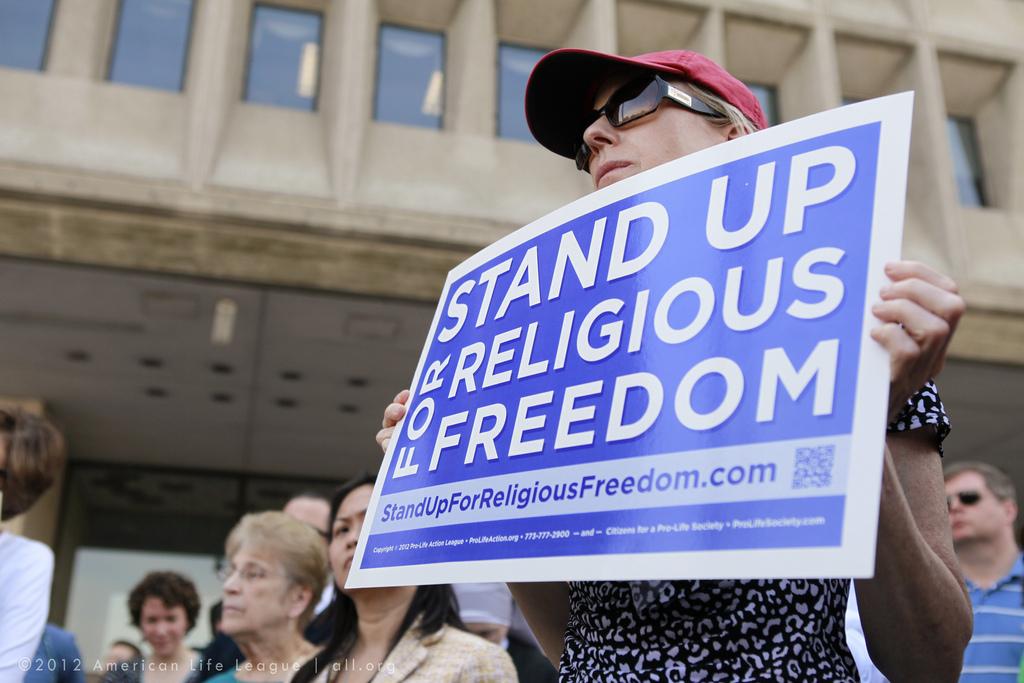 (Credit: American Life League, Flickr Creative Commons)
(Credit: American Life League, Flickr Creative Commons)
The Bible is filled with euphemisms.
My favorite one growing up was “feet.”
No doubt this was because I was a 12 year old boy and considered any sort of genital related talk to be comedy gold.
If you’re confused, allow me to apologize and explain. Not always, but sometimes like in Isaiah 6 when the seraphim use two of their wings to cover their feet, “feet” is used a biblical euphemism for genitals. Obviously, the mere mention of the word “genitals” is enough to make sweet old church ladies faint, so “feet” becomes a helpful stand-in to cover up an uncomfortable reality.
The Church can’t take credit to that particular biblical euphemism, since the Church didn’t exist when the Old Testament was written, but the modern Church has added its own euphemism to the canon.
Religious freedom.
Proponents of this mantra from North Carolina to Georgia to Mississippi to anywhere else far right politicians may be in charge, would have you believe this innocent sounding phrase is about nothing more than the defense of an important constitutional freedom.
In reality, as religious freedom bill after religious freedom bill has passed in state legislatures across the land, it’s become clear that “religious freedom” (and it’s twin, “sincerely held religious beliefs”) is nothing more than a euphemism for “discrimination.”
Laws like the one recently passed in Mississippi (and Georgia, though thankfully that one was vetoed) don’t actually protect religious freedom. That freedom to sincerely believe whatever you want to believe is already protected. It’s been that way since 1776. This is why no minister in any church, mosque, or synagogue anywhere in the country has been forced to marry anyone – gay or straight – nor have they been punished by the government for refusing to do so nor will they at any point in the future be compelled or punished so long as the First Amendment remains a part of the Constitution.
Which is what makes religious freedom bills nothing more than thinly veiled justifications for discrimination in the name of Jesus. They’re needless grandstanding that only exists to target and marginalize a particular segment of society. Defenders of these bills decry accusations of discrimination, but their actions are the very definition of the word.
According to Merriam-Webster’s dictionary, discrimination is defined as “the practice of unfairly treating a person or group of people differently from other people or groups of people.” When a certain group of people – in this case the LGBT community – are denied goods and services made available to everyone else, what you have is the literally the textbook definition of discrimination. No amount of hiding behind euphemisms or mental gymnastics can change that fact.
And yet, religious freedom fighters bend over backwards to justify their hypocritical approach to the purported sin in their midst.
According to those with “sincerely held religious beliefs,” by baking a cake or arranging flowers or taking pictures for a same-sex wedding ceremony, the person providing these goods and services is endorsing the union itself and, thus, “complicit in sin.”
But as so many have demonstrated before, this logic simply doesn’t hold water.
On the one hand, if this line of reasoning were true, then every employer on earth would be complicit in the sin of their employees by giving them the financial means to commit any number of sins. And so would the bank teller handing over cash to the compulsive gambler and the taxi driver ferrying a couple to the hotel where they will have an affair or any other third party providing goods or services that can be used in sinful ways.
Yet, conspicuously, it is only when LGBT folks are involved that Christian business owners suddenly become complicit in their customers’ sin.
But even in the specific instance of a same-sex wedding, the logic fails, the hypocrisy is exposed, and the religious freedom justification reveals itself to be the euphemism for legal discrimination it truly is.
For example, if a florist is complicit in sin for selling flower to a same-sex couple, then they’re also complicit in sin when they sell flowers to a person giving that bouquet to their mistress….or the spouse they’ve married after being divorced.
And if a baker is complicit in sin for baking a cake for a same-sex wedding, then they’re complicit in sin when they sell donuts and pastries to people struggling with gluttony.
And if a photographer is complicit in sin for documenting a same-sex wedding, then every photojournalist who documents a crime for the local news is complicit in the committing of those crimes.
But nobody believes those things and the very fact that they don’t and yet still argue that providing services to LGBT folks would make them complicit in that sin reveals a particular prejudice and burning desire to discriminate against the LGBT community that is not reserved for anyone else.
What is especially disturbing about all of this, other than obviously the discrimination itself, is the fact that the push for passage of these bills is being led by people who claim to be Christians, who profess that they model their lives after Jesus of Nazareth.
Regardless of what side we take in the war for religious freedom, the identity of American Christianity is increasingly becoming defined not by what we don’t do or even by who we don’t associate with, but but by how we actively discriminately against others.
It should (but apparently doesn’t) go without saying that discrimination is antithetical to the way of Jesus. Jesus told his followers, “A new command I give you: Love one another. As I have loved you, so you must love one another. By this everyone will know that you are my disciples, if you love one another.”
The way Jesus loved others was through radical acts of inclusion and embrace – especially involving people considered “sinners” by the religious establishment.
In a culture defined by ritual purity, particularly around the dinner table, Jesus chose to eat with sinners even if it meant the religious leaders of his day thought doing so was an endorsement of their sinful lifestyle. Lepers were marginalized on their fringes of society for fear that their incarnated sin would contaminate the holy. Jesus embraced them. And even the miraculous act of healing stands in radical opposition to the sanctified discrimination found in American Christianity. For, by healing someone, regardless of who they were, Jesus was effectively enabling them to go on living a life that would inevitably result in sin. And yet no one would argue that Jesus was complicit in that sin because he gave them the means – a healthy life – to continue sinning because outside of the newly declared religious freedom war, we all recognize that serving our neighbors – whether in business or out of love, does not makes us inherently complicit in their actions, sinful or otherwise.
In other words, even though you may be able to find biblical proof-texts for believing your LGBT neighbors are “living in sin,” there is nothing you can appeal to in the life of Jesus that justifies treating them like second-class citizens. Even if you believe they are the worst of sinners, hellbent on destroying America, if Jesus can serve others regardless of their perceived sinfulness, then so can those of us who call ourselves his disciples.
In fact, we must.
Now, obviously if you’re convinced the LGBT community is a den of sin, I don’t expect to change your mind with a mere blog post. But I do hope you will reconsider how you respond to the changing world around you because treating your LGBT neighbors like lepers who must be avoided, excluded, and marginalized at all costs is fundamentally antithetical to the way of Jesus at the deepest level – regardless of whether you think they are sinners or not.
Moreover, not only is the religious freedom war is a fight the Church cannot win, but in becoming sanctified agents of discrimination in the name of Jesus we will ensure that LGBT folks aren’t the only ones who will never darken the doors of a church again. That is to say, if refusing service to LGBT customers is meant to somehow proclaim the truth of “God’s intended plan for creation,” it’s an evangelistic effort that’s not only destined to fail, it’s already ensuring that future, unrelated efforts to preach the gospel will fall on deaf ears no matter how noble and loving they may actually be.
I get that you may have you sincerely held religious beliefs. We all do. But as Christians, we all must remember that for Jesus, being his disciple is defined by sincere love, not sincerely held beliefs.
We simply cannot incarnate that love and marginalize our neighbors at the same time.
Which means if you insist on having the right to discriminate against your neighbors in the name of “religious freedom,” know this: you’re not following in the footsteps of Jesus.
You’re rejecting everything he stood for.












